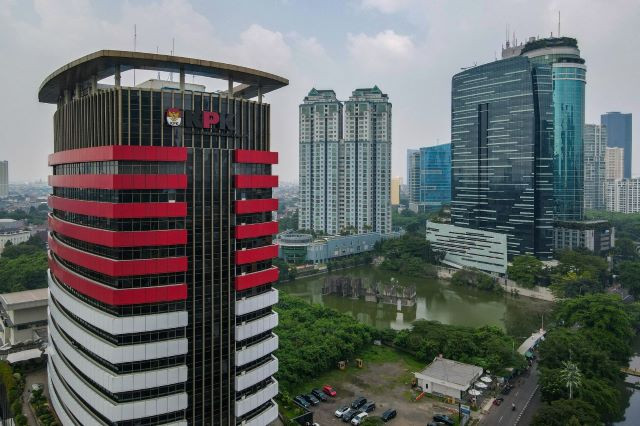Popular Reads
Top Results
Can't find what you're looking for?
View all search resultsPopular Reads
Top Results
Can't find what you're looking for?
View all search resultsExecutive Column: Better infrastructure needed to boost property performance
Property consulting firm Jones Lang LaSalle predicts that Indonesia’s property market will perform well until at least 2013, mainly driven by the country’s robust economic growth and the coming of foreign capital
Change text size
Gift Premium Articles
to Anyone
P
roperty consulting firm Jones Lang LaSalle predicts that Indonesia’s property market will perform well until at least 2013, mainly driven by the country’s robust economic growth and the coming of foreign capital.
The growth of industries, particularly in retail, telecommunications, pharmacy, manufacturing and services sectors, have led to a significant increase in demand for office spaces, the firm says. The trend will increase price and rent.
According to the firm’s latest survey in the first half of this year, the office space take-up in Jakarta’s CBD reached 243,500 square meters (sqm), while new supply was 51,297 sqm.
By the end of this year, supply will be around 150,000 sqm, while demand may reach 365,000 sqm.
Given that situation, Jones Lang LaSalle estimates that rental prices will rise between 15 and 20 percent from the current Rp 142,960 per sqm.
To dig deeper on the subject of property markets in Indonesia, The Jakarta Post’s Rangga D. Fadillah talked with Jones Lang LaSalle chief executive officer for Asia Pacific Alastair Hughes and country head for Indonesia, Todd Lauchlan. The following are the excerpts:
Question: As the global economy begins to recover from the recent downturn, how do you see the property market in Asia Pacific?
Answer (Hughes): If I were to go back to 2009, this could be a very quick conversation because all markets in Asia Pacific were doing the same thing. Businesses were generally shrinking and at the same time, office buildings were being delivered in to the market. There was not much demand, a lot of supply and rent fell. The trend took place in all major cities such as Sydney, Shanghai, Singapore, or Jakarta.
Now, in 2011, it is hard to sum up the trend in Asia Pacific quickly, because there are different things happening in the market.
In Japan, for example, even prior to the earthquake, there was very low economic growth, which leads to low occupier demand.
We expected the rent in Japan could rise around now, but due to the earthquake, I think it will take probably until mid next year for the economy to get back and we can observe the rental growth in Japan afterward.
In Seoul, the economy is growing faster than Japan, but not that fast. The market is marked with a low level of demand, but a huge level of supply. The development of buildings, started in 2007 and 2008, are now being delivered into the market and rent is falling very quickly.
Another example of a slightly different trend will be Shanghai where the economy is growing really quickly. Demand for spaces is growing very quickly, both from multinational companies and Chinese companies.
There is a lot of supply and rent is gently rising because there is slightly more demand than supply.
Lauchlan: And now we compare those trends with Jakarta. In 2009 when the crisis happened, rent in other markets such as Singapore and Hong Kong was down by between 40 to 60 percent, but in Jakarta, rent was only down by about 5 percent. We [Indonesia] are a domestic-driven economy and we did not have a lot of supply at that time. As a result, we did not get hit by the crisis. Demand was still positive.
Now, you see a lot of money coming in and foreign businesses such as banks, insurance companies and consumer goods companies. The domestic growth will be marked by companies expanding their businesses and looking for more spaces.
The positive growth can be seen not only in the office market, but also in condominiums. The growth is very strong, we see many expatriates taking apartments.
We also noted significant interest from foreign players to enter into Indonesia’s property market. We have listed more than 30 foreign developers and investors, which are planning to place capital in different sectors. Most of them are looking for opportunities not only in Jakarta, but also some other major cities in the country.
How about the potential of property markets outside Jakarta?
Bali is very hot. We can see a significant capital growth there this year. Low cost airlines really deliver phenomenal benefits to the Bali market. But it is a resort-based market, it is not office-based or condominium-based. Surabaya is a market that we think will recover in a year or two. There were a lot of properties built in the 1990s and it will take a while for [them] to be absorbed. Although some of our clients do very successful developments there, it is not as strong as Jakarta and Bali.
What is needed to strengthen the growth of Indonesia’s property market?
I think it is important to improve the availability of infrastructure to improve the ability to capture the interest of tenants and buyers in the buildings. I think one of the reasons why property in Jakarta’s CBD is cheaper than other locations in Asian capitals is Jakarta does not have infrastructure that other Asian capitals have.
What is the most important infrastructure that should be installed?
A rapid transit railway and toll roads. It is also important to integrate the public transportation system with buildings.










